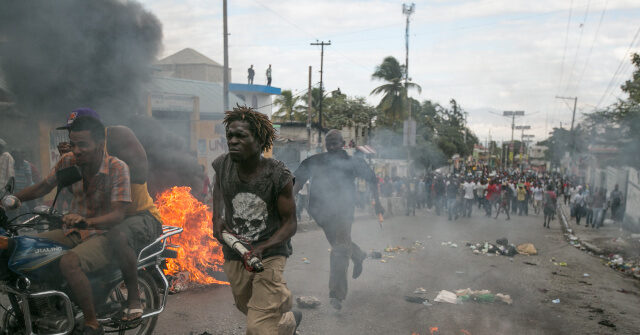We support our Publishers and Content Creators. You can view this story on their website by CLICKING HERE.

Where were Haiti’s elite anti-gang police on October 3 when more than 88 Haitians were being murdered by gangs in a rural town?
Hard to find, except for in New York where former anti-gang cops are working in low-wage Bidenomics jobs because President Joe Biden’s migration chief gave them visas to fill jobs in President Joe Biden’s economy.
The U.S. Department of State’s “2024 Trafficking in Persons Report: Haiti,” admitted:
Law enforcement experienced a significant reduction in its [9,000 person] workforce as police officers fled the country; media reported 3,000 police officers departed Haiti since 2022, the majority of whom anecdotally left on the U.S. government’s [visa] processes for Cubans, Haitians, Nicaraguans, and Venezuelans, a humanitarian parole program [created by Biden’s border chief, Alejandro Mayorkas] that included Haitians as of January 2023.
The New York Times described the aftermath of the Mayorkas-enabled massacre at the town of Pont-Sondé:
When Ms. [Bertide] Horace, who was about 10 miles away in the city of Saint-Marc, arrived with heavily armed police officers four hours later as the sun was rising, she said the streets of the town were strewed with bodies.
“People were coming out of hiding and trying to flee,” she said in an interview. “It was total panic.” The wounded, she added, were walking around “begging for help.”
The violence, perpetrated by a gang called the Gran Grif, left at least 88 people, including 10 gang members, dead, the United Nations said.
DocumentedNY.com spoke to four of the Haitian police officers living in New York in June 2024;
[Cosby] Jean-Charles is a security agent at John F. Kennedy Airport. [Roodolphe] Nicolas briefly found work as a parking valet in Manhattan for one month until his work permit expired … Miguel Chardovoine, who runs a small tree-cutting business in Buffalo, and Bernard C. Pierre, a cook at the Barclays Center, who prepares food for the Brooklyn Nets. Pierre also works as a parking valet in Manhattan and stock clerk at a Dollar General store.
…
[Nicolas had] graduated from the 20th class of the Haitian police force [in 207], known as Orion. His comrades-in-arms called him ‘Battalion’ because he ranked second in the Haitian police academy. Because of his outstanding performance, he could choose the police unit he wanted to join. While most opted for the anti-drug trafficking unit, he ultimately joined a specialized unit that maintains public order and handles protests and civil unrest.
The ex-cops said they saw how Haiti’s elites protect the gangs whenever the police close in:
Like Chardavoine and Nicolas, Jean-Charles was fed up with a police institution he described as “sick to the bone.” He said he witnessed so much wrongdoing where services were focused on benefiting the wealthiest. Like his other colleagues, he told Documented there’s no real motivation from the police and the Haitian government to solve the crisis with the gangs.
The article was headlined “Members of Elite Haiti Police Force Lost in New York as Asylum Seekers and Parolees.”
The four ex-cops are just a few of the roughly 500,000 people extracted from Haiti by U.S. immigration policy, which is run by Mayorkas and his progressive deputies. They gave “Temporary Protected Status” to roughly 300,000 Haitians after they illegally crossed the border, and awarded travel visas to another 214,000 via Mayorkas’ parole program.
These days, educated Haitian migrants are being used around the country to manage the growing population of productivity-cutting, wage-shrinking, and rent-inflating Haitian workers in cities such as Springfield, Ohio, Washington, Ind., and Charleroi, Pa.
For example, a former officer in the Haitian Coast Guard was hired to help bring Haitians into Charleroi and its low-tech employers, such as Fourth Street Foods:
Bernabe, a graduate of the United States Coast Guard Academy and the Haitian State University, has a wide-ranging career in public service including the military, law enforcement, and education.
….
Leanna Spada, Executive Director of the Mon Valley Regional Chamber of Commerce, with its headquarters in downtown Charleroi, spearheaded the search which led to Bernabe’s hiring. The search committee sought out an individual who would be a trusted partner to help capture the opportunity that the new wave of immigrants has presented within the Mid-Mon Valley.
“We brought life to the community,” Evency Dorzelma, a former Haitian police officer in Charleroi, Pa., told the Washington Post on October 9. “We don’t do no harm to anyone.”
Mayorkas’s multi-channel policy of Extraction Migration is designed to extract human resources from poor nations to boost consumption and fill jobs in the United States. Mayorkas also is trying to emulate Canada’s importation of Indians to provide consumer-economy employers with a cheap, subordinate, and disposable workforce.
In March 2021, Vice President Kamala Harris declined to take Biden’s offer of a leading role in immigration policy. Since then, she has not publicly objected to Mayorkas’ policies and she is widely expected to continue those policies if she is elected president.
Understandably, those policies are extremely unpopular in the United States, in part, because they help push millions of Americans out of the workforce as they push Americans’ economy into a low-tech future.
Many people have pointed out the disastrous results of Mayorkas’ colonialism-like policies in Haiti.
“It’s a brain drain,” Dr. Jean Ardouin Louis-Charles, the secretary-general of the Haitian Medical Association, told the Miami Herald newspaper, which added:
The departures left the Sanatorium [Hospital] with just half of its staff by the time the Grand Ravine gang moved in. At the Hospital of the State University of Haiti, commonly referred to as the General Hospital, there was just one medical resident in pediatrics.
“Given how the situation is in the country …[the Mayorkas parole program] has opened a door for them. But for the country, it has huge consequences,” he said.
“We have a need of 7,050 school benches, 971 chairs and 227 chalkboards,” said Auxène, the ministry of education’s director for Southeast Haiti. “I’ve been director for three years and because of the lack of security, the ministry of education has never been able to get us benches and the director before me never received any.”
Worse than a brain drain, Mayorkas’s tempting escape hatch also guts the chances that Haitian leaders, graduates, police, and citizens will collectively risk their lives and fortunes to rebuild a democratic society for the nation’s 11 million people.
“Despair reaches such a level that the daughters and sons of the country only consider their future elsewhere,” one top Haitian official told the New York Times reporter in March 2023.
Even the DocumentedNY.com article was written by another extracted Haitian:
Ralph Thomassaint Joseph is the Caribbean Communities Correspondent for Documented. He studied Law and Sociology in Haiti and holds a master’s degree in Digital Journalism from New York University.
Plenty of reporters understand the chaos caused by Mayorkas in Haiti, but they downplay the connection to immigration policy created by the U.S. establishment. For example, two reporters at the establishment New York Times noted in a May 2024 article:
Many officers have been killed, resigned or simply walked off the job, Mr. Elbé, the police chief, said. But, he added, a significant number had left Haiti under a U.S. humanitarian parole program for Haitian migrants introduced last year by the Biden administration.
Mayorkas has repeatedly explained that he supports more migration because of his migrant parents, his sympathy for migrants, and his support for “equity” between Americans and foreigners. He even insists that Springfield “has blossomed by reason of the infusion of [up to 20,000] individuals from another country.”
He also justifies his welcome for migrants by saying his priorities are above the law, claiming that the “needs” of U.S. business are paramount — regardless of the cost to ordinary Americans, the impact on U.S. children, or Americans’ rational opposition.
But there is an alternative explanation for his extraction policy.
The General Secretariat on Haiti of the Organization of American States, where the U.S. plays a dominant role, suggested in August 2022 that the international community should give up any hope of stabilizing Haiti. Instead, the secretariat said nations could treat Haiti as an endless source of uneducated migrant labor, consumers, and renters:
The international community, international financial institutions, the multilateral system, and the international financial community of donor countries must make a decision: whether they want to industrialize Haiti sufficiently to ensure work for nine million Haitians, or whether it is economically more profitable to continue absorbing Haitian migrants [emphasis added] and let host countries accommodate them as and how they can and in such economic conditions as they can offer.
That policy option has no public name, as yet, because it would abandon Haiti and its population of 11 million left-behind people to squalor and violence.

 Conservative
Conservative  Search
Search Trending
Trending Current News
Current News 







